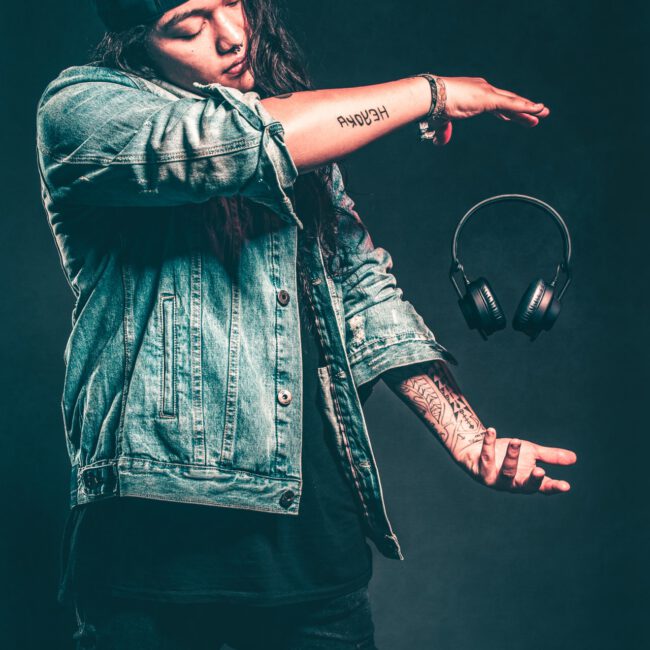A disc jockey, often abbreviated as DJ, is a person who plays existing recorded music for a live audience. Most common types of DJs include radio DJ, club DJ who performs at a nightclub or music festival and turntablist who uses record players, usually turntables, to manipulate sounds on phonograph records. Originally, the disc in disc jockey referred to gramophone records, but now DJ is used as an all-encompassing term to describe someone who mixes recorded music from any source, including cassettes, CDs or digital audio files on a CDJ or laptop. The title DJ is commonly used by DJs in front of their real names or adopted pseudonyms or stage names. In recent years it has become common for DJs to be featured as the credited artist on tracks they produced despite having a guest vocalist that performs the entire song: like for example Uptown Funk.
DJs use audio equipment that can play at least two sources of recorded music simultaneously and mix them together to create seamless transitions between recordings and develop unique mixes of songs. Often, this involves aligning the beats of the music sources so their rhythms do not clash when played together or to enable a smooth transition from one song to another. DJs often use specialized DJ mixers, small audio mixers with crossfader and cue functions to blend or transition from one song to another. Mixers are also used to pre-listen to sources of recorded music in headphones and adjust upcoming tracks to mix with currently playing music. DJ software can be used with a DJ controller device to mix audio files on a computer instead of a console mixer. DJs may also use a microphone to speak to the audience; effects units such as reverb to create sound effects and electronic musical instruments such as drum machines and synthesizers.A disc jockey, often abbreviated as DJ, is a person who plays existing recorded music for a live audience. Most common types of DJs include radio DJ, club DJ who performs at a nightclub or music festival and turntablist who uses record players, usually turntables, to manipulate sounds on phonograph records. Originally, the disc in disc jockey referred to gramophone records, but now DJ is used as an all-encompassing term to describe someone who mixes recorded music from any source, including cassettes, CDs or digital audio files on a CDJ or laptop. The title DJ is commonly used by DJs in front of their real names or adopted pseudonyms or stage names. In recent years it has become common for DJs to be featured as the credited artist on tracks they produced despite having a guest vocalist that performs the entire song: like for example Uptown Funk.
DJs use audio equipment that can play at least two sources of recorded music simultaneously and mix them together to create seamless transitions between recordings and develop unique mixes of songs. Often, this involves aligning the beats of the music sources so their rhythms do not clash when played together or to enable a smooth transition from one song to another. DJs often use specialized DJ mixers, small audio mixers with crossfader and cue functions to blend or transition from one song to another. Mixers are also used to pre-listen to sources of recorded music in headphones and adjust upcoming tracks to mix with currently playing music. DJ software can be used with a DJ controller device to mix audio files on a computer instead of a console mixer. DJs may also use a microphone to speak to the audience; effects units such as reverb to create sound effects and electronic musical instruments such as drum machines and synthesizers.
